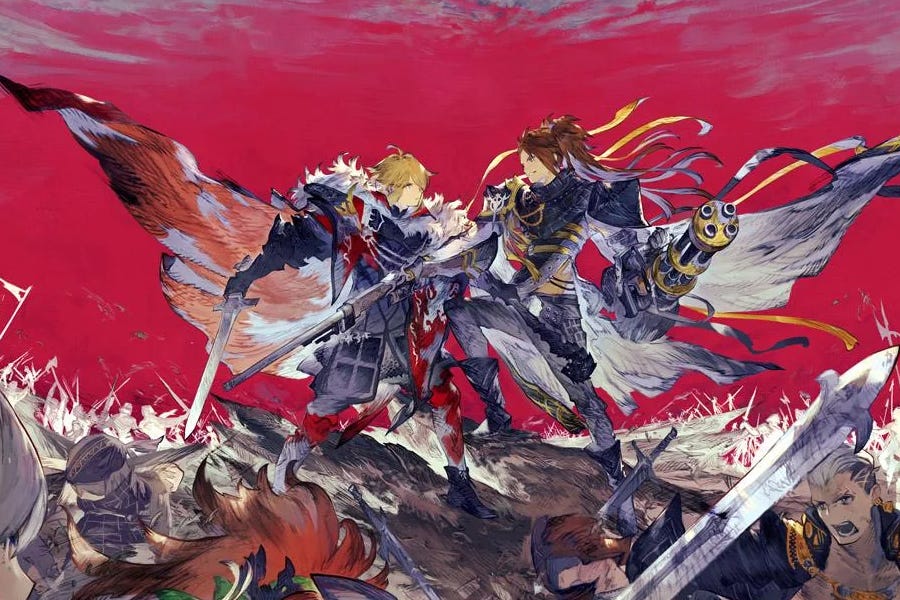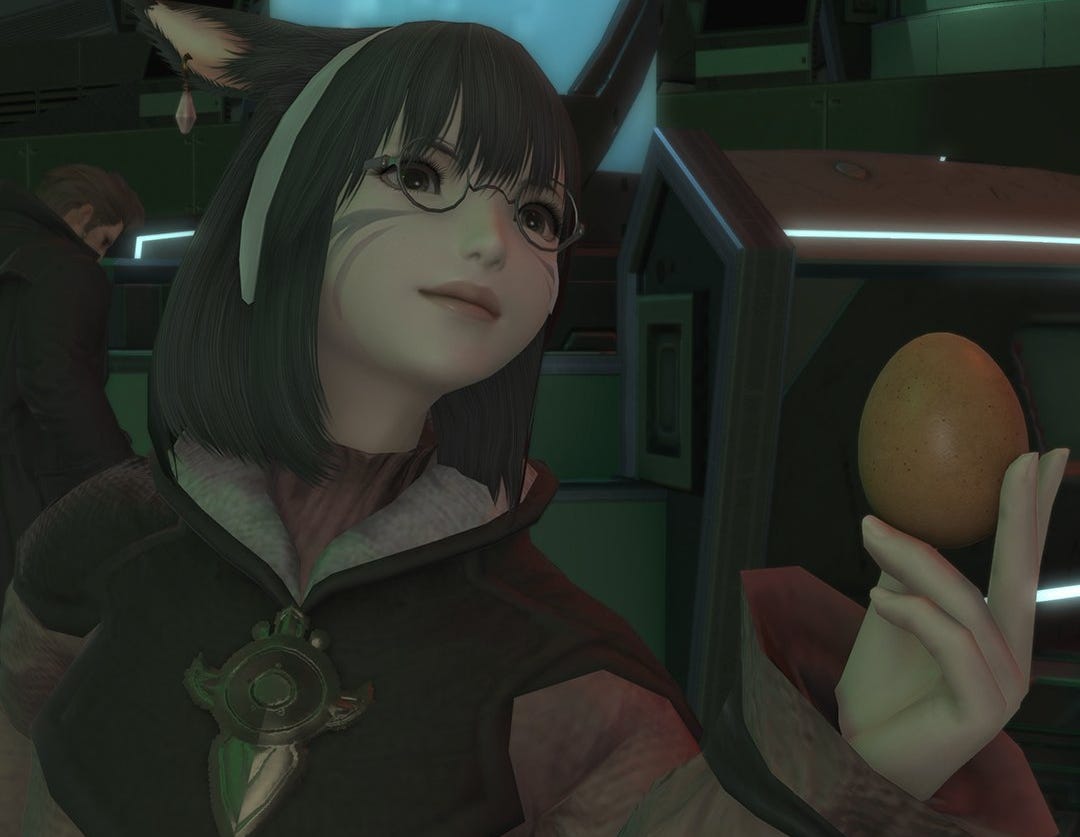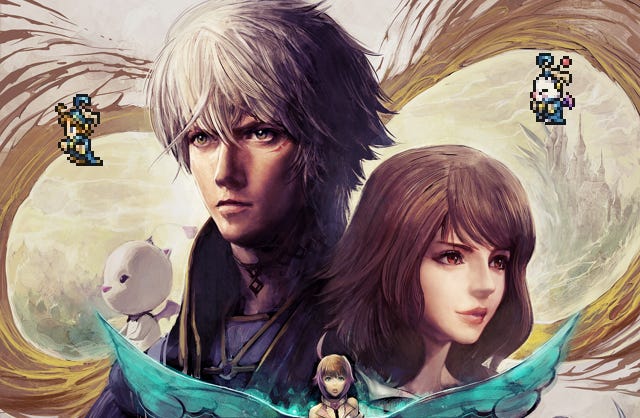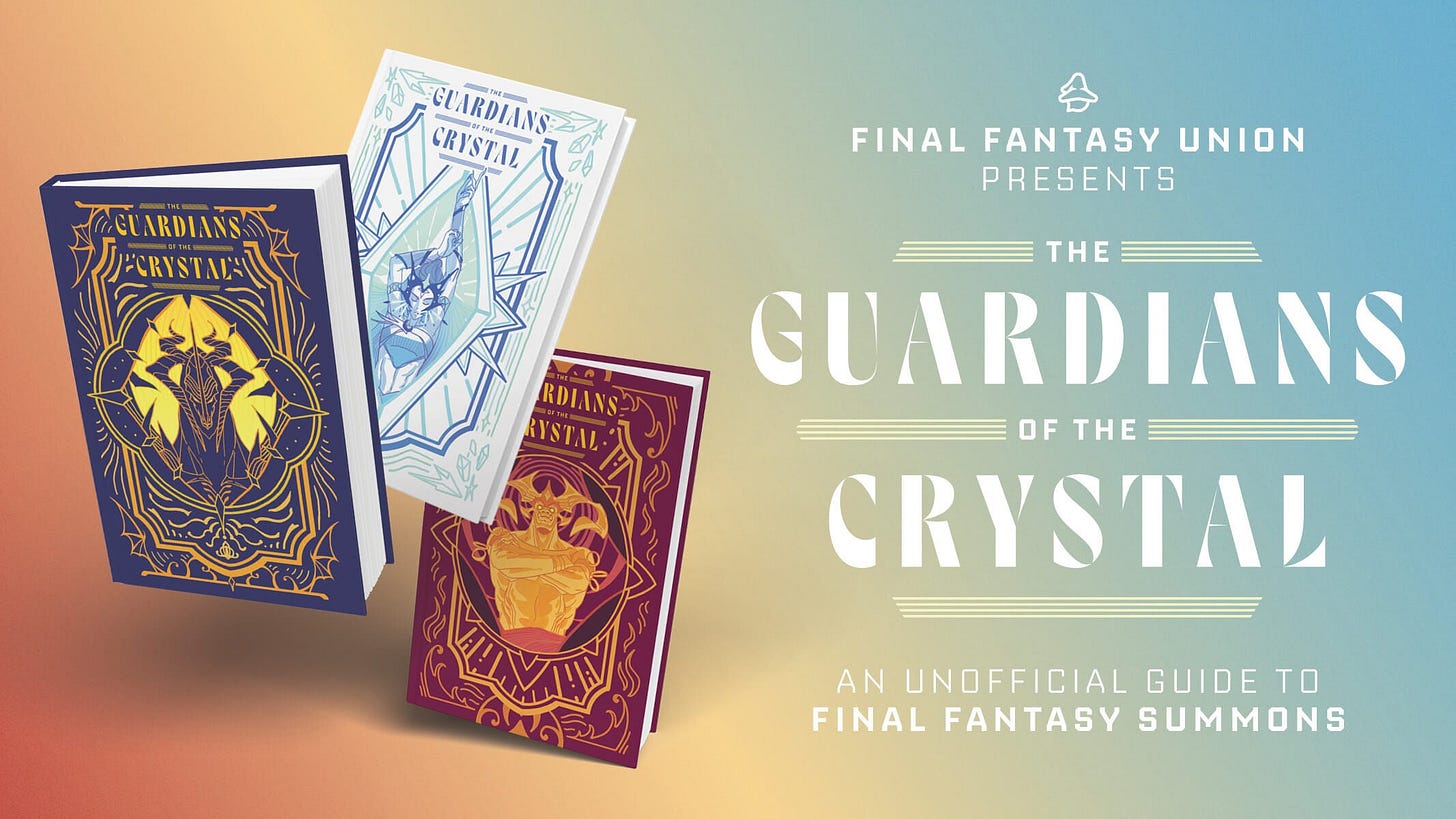Wark Digest #200 - Gacha Going
Welcome back to the Wark Digest, your weekly newsletter of new developments and historical insights from the Final Fantasy universe. I’m Chris, aka Hoogathy, and this week another one bites the dust, as War of the Visions’ days are now numbered, teasing the end of an era for a particularly divisive part of Square Enix’s business model over the last decade.
This week’s newsletter is 2360 words, a 11-minute read.
The War of the Visions Comes To An End
In a move that’s all too familiar lately, Square Enix has announced the termination of another mobile game, and this time it’s the War of the Visions that’s slated to ride off into the sunset.
What’s going on:
On May 29th, service for War of the Visions: Final Fantasy Brave Exvius will be terminated, 5 years and 2 months after its initial launch (which they announced on the anniversary—happy birthday!)
In the official statement, the dev team said “[since launch] we've strived to provide an enjoyable gaming experience for our players every day that could exceed the day before. However, we've come to the conclusion that it would be difficult to maintain a satisfactory app experience, and therefore to discontinue the app service”
Sale of premium currency was immediately terminated, and players will have until the end of the game’s service to use any resources they already possess
Unlike its brother Brave Exvius, this end-of-service applies worldwide, where Brave Exvius continues to operate in Japan only (like Final Fantasy Record Keeper)
Back in September 2023, WotV’s global and Japanese iterations were consolidated, synchronizing their content instead of the translated version running a few months behind Japan’s schedule (a standard approach for gacha games, giving the localization teams a buffer)
With two months left, the band has already begun playing on the deck of the Titanic, with heartbroken players sharing their teams and achievements on social media
The remaining gacha banners won’t feature units from “crossovers” with other FF/SE games—meaning only the original characters, not guests like Cloud, Vivi, Lara Croft, Joker, or the DQ Slime (wow, this game had some wacky crossovers)
What we thought:
”It would be difficult to maintain a satisfactory app experience” is a business-speak euphemism for “we can’t provide a worthy experience for players while making enough money for the company”
The writing has been on the wall for this one for quite some time, and in a way it’s almost a miracle that it held out this long
As we’ve been reporting, WotV was slipping lower down the gacha game revenue charts for some time
The original content synchronization seemed like a Hail Mary to forestall this conclusion, instead of prematurely ending Global and continuing in Japanese
Brave Exvius’ conclusion half a year ago was another harbinger
This also seems to be part of the long-term restructuring Square Enix CEO Takashi Kiryu announced last spring, and the associated effort to rely less on outsourcing—the Brave Exvius universe was produced in conjunction with Gumi Inc.
WotV always felt like a dodge from giving us the FFT remaster that so many people want; now that there’s one less strategy-RPG in town, SE will finally spring for that remake?
What’s next? Ever Crisis now stands as the sole Final Fantasy mobile game available in English (yup, even Final Fantasy XV: A New Empire is gone, if it ever truly counted). It seems to be holding its own, and has plenty of story material to work with, on top of its own original, non-canon scenarios. Time will tell with this market, however, and we’ll discuss that more in depth in just a moment…
(FFRK and FFBE continue to operate in Japan for the time being.)
Thundaga Round (Savage)
As detailed last week, Final Fantasy XIV patch 7.2 dropped on Tuesday, and initial reactions to the new MSQ content seem to be quite positive—showing that sometimes we need to judge these storylines when we have the fuller image
Let’s just say, players who are also FFIX fans are eating very well
According to olblaze, a devoted Tekken fan who has tracked the popularity of the game’s characters for 6 years, Clive Rosfield is the most popular guest character the series has had to-date, “significantly“ surpassing the second-most popular guest, The Walking Dead’s Negan and ranking “leagues ahead of Noctis” from Tekken 7
“Despite what people said about wanting Tifa, it turns out that tons of people picked up Clive“
This is notable as Noctis was once a notorious presence in T7, and Clive has overshadowed the competition in very short time
At an unexpected, short-notice Nintendo Direct yesterday, Square Enix didn’t announce any new Final Fantasy projects—though they did provide the first real look at Dragon Quest I&II HD-2D, and shadow-dropped SaGa Frontier 2 Remastered (Akitoshi Kawazu’s SaGa franchise, of course, being a descendant of Final Fantasy through the Legend spin-offs on Game Boy)
SaGa Frontier 2 is also out on PS4/5, Steam… and iOS/Android?
Final Fantasy TCG’s new set, Tears of the Planet, is officially on sale today
Has The Mobile Bubble Burst?
With War of the Visions joining Mobius and Dissidia Opera Omnia in Mobile Game Valhalla (alongside a smattering of lesser experiments, and half of Record Keeper and Brave Exvius), it feels like the end of an era for this department of Square Enix and Final Fantasy. Let’s take a moment to look back at the history and impact of this department, and consider its future.
Where we’ve been:
Final Fantasy has a long history with mobile phone gaming, if you consider the games for the Japan-only DoCoMo phones—Before Crisis launched in September 2004 and saw active updates until April 2006, while it remained playable (if you had the right device) up until March 2018
Square Enix’s modern mobile games arose alongside the prominence of iPhone and Android smartphones, starting as early as 2009, with the spin-off of a spin-off, Crystal Defenders: Vanguard Storm, and 2010, when they tested the waters with mobile ports of the Final Fantasy I and II 20th Anniversary remasters
Smartphones and tablets soon saw their own original games, like the more traditional Final Fantasy Dimensions and Dimensions II, or puzzlers like Pictlogica Final Fantasy, or tie-ins like (the Japan-exclusive) Final Fantasy VII G-Bike
Like Final Fantasy IV: The After Years, Dimensions was a holdover from the era of episodic games—which was itself a somewhat contentious game format
As it became apparent that these platforms were going to be a viable market for the games industry to explore, more Final Fantasy games suited to their forms began to appear
Perhaps it all got off on a bad foot in January 2013 with Final Fantasy All The Bravest, a razor-thin gameplay experience with a disproportionate amount of paid content that instantly embarrassed Square Enix and harmed the prospect of playing games on such devices
However, at the same time paid DLC was becoming even more of an industry standard on consoles
“Gacha” games became very popular around the same time—named for the Japanese arcade machines called gachapon, which drop a capsule with a random prize… but the genre quickly earned a rep for greed, and fleecing customers
Typically players can only do so many randomized draws (or “pulls”) for free, earning characters and/or gear for their roster, and the games casually suggest that real money could be used to “earn” more pulls
The first title that was both legitimate and gacha-based was Final Fantasy Record Keeper in September 2014 (March 2015 for Global), a mashup title blending the legends of the mainline series into a universal storyline and 2D art style
DeNA Inc. developed this game with SE’s support and blessing
Following close behind was Mobius Final Fantasy (June 2015/August 2016), a more visually impressive game that drew upon plot elements from the original Final Fantasy, and featured voice acting in Japanese and English
Rounding out the original trio was Final Fantasy Brave Exvius, a 2D game developed in conjunction with Gumi Inc., featuring a more prominent original story
Within a year and a half, Final Fantasy suddenly had three distinct mobile games on iOS/Android, each clamouring for microtransactions but offering different experiences…and then came a fourth, Dissidia Opera Omnia, though it was a long time coming for the English market, debuting in 2018
Mobius ended in 2020, but was already being “replaced” by War of the Visions, a Brave Exvius spin-off also developed by Gumi—so for a very brief moment, we had five mobile Final Fantasy titles reaching into our wallets
RK went Japanese-only in 2022, while DOO and BE held out until 2024; by this point, a brand new contender, Final Fantasy VII: Ever Crisis, had stepped into the gap they left
Where we’re headed:
Here’s the thing: gacha gaming is a paradox factory
They lure people in being free-to-play, then dangle paid benefits in their face
These titles can supplement the company’s budget, if their production costs stay low and the paid options draw in enough income… but advertising “free” then demanding payment is disingenuous
Anytime payment is an option, certain considerations must be made: are the odds for paid draws different? What happens if someone pays to pull and gets nothing good?
If you devote a team to make a free-to-play mobile game in hopes that people will pay for microtransactions and help fill your company’s coffers, have you really made a free-to-play game? And if it’s not bringing in sales, what are you really using those resources for, and how do you support the staff creating them? What justifies these games’ existences?
Square Enix cannibalized their own audiences by putting out too many games in a short period and asking fans to throw each of them a few coins consistently; now they’re left with a lone horse in the race, and the gacha balloon has burst
The market has shifted in recent years, driven by the advent of Genshin Impact and other MiHoYo games—now every company wants their mobile titles to print money like these games consistently do, and frankly, that’s not feasible long-term
It’s unusual that MiHoYo’s three games (Genshin, Honkai: Star Rail, and Zenless Zone Zero) haven’t completely collapsed upon each other in this department, but they have distinct vibes and settings, and don’t have the legacy baggage like anything with Final Fantasy in its title
Since they staked the top of the market, only two major contenders have emerged to consistently threaten the top ranks, as we recently mentioned: Pokémon TCG Pocket and Love and Deepspace
As these games rake in money, more and more mid-performing gachas keep falling off, like BE or Atelier Resleriana (which launched near EC and closed this week)
Frankly, it always feels gross to judge a game by how much money it fleeces from players each month, but that’s the metric
Industry trends could force a shift in this genre soon, but Squeenix is already at the point where they need to re-evaluate their investment in smartphones
It seems unlikely that they’ll launch any more mobile gacha FFs anytime soon, and that’s probably for the best—unless they’ve been cooking internally, and they concoct something that could rival Genshin and L&D
Losing out on the gacha market profits is only a loss if you would’ve been making a profit, after all; otherwise you’re spending resources on something that’s not profitable, and that’s just bad business; better to use staff elsewhere.
Mobile gaming is getting bigger slowly, but still feels like it hasn’t truly taken off—you can play Dead Stranding on iPhone 15, but is it worth it to play it there? I think it’s a tough time for Square Enix to experiment in this space
What’s next? The elephant in the room that’s acknowledged less often is game preservation. Losing access to these games when they go offline can be a huge blow to the history of games, and fans can no longer experience them firsthand. If we’re lucky, there will be video archives, but they just don’t cut it.
If Square is focusing on smaller games instead of aiming for the middle, re-releasing the fallen games in an offline form would be a relatively easy way to move some units. Fans of the fallen games still hold out hope for such revivals, even years later, and there’s an effort to get the likes of Before Crisis off its archaic platform.
Around the Union
Speaking of mobile games, the Final Fantasy XIV mobile reimagining is on the way, rising from the ashes of a similar planned project for Final Fantasy XI. So, for the benefit of old FFXI vets and those who never got to head to Vana’diel themselves, we present “The Curious Case of Final Fantasy XI Remake,” where we explore everything known about the project and what it could have been.
Also, thank you to everyone for helping us reach our two-hundredth issue! It’s my honour to bring you the latest news and context for our favourite series each week, and I hope you’ll join us for the next 200 issues. (June will mark our fourth anniversary!)
Finally, the Kickstarter campaign for our second book, The Guardians of the Crystal, is already off to a terrific start… and it hasn’t even officially launched yet! We have over 600 followers registered so far to be notified upon its actual launch—can you help us reach 1000?
Now you’re up to speed! From the whole team at Final Fantasy Union, thank you for subscribing. Please let us know what you think of our coverage, and what you’d like to see covered in our weekly installments. As ever, if you’ve enjoyed our work, please share it with your friends!
Join the discussion on our Discord!
Or, find Final Fantasy Union on social media: Facebook | Instagram | Bluesky |
Until next time, kupo!








